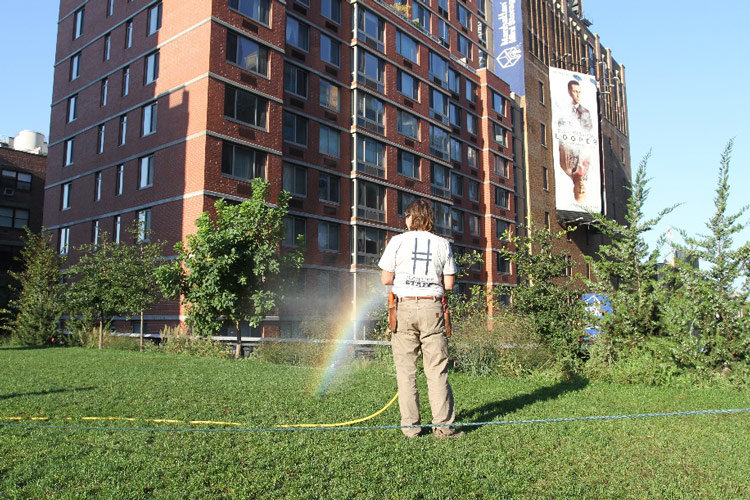your inbox
Sign up for the High Line newsletter for the latest updates, stories, events & more.
Gardening in the Sky: That Black, Bubbling, Beneficial Brew of Compost Tea
By Erin Eck | November 2, 2015

Casting of worm and powder of seaweed, plus hydrolysate of fish… No, this isn’t a witch’s brew, but the compost “tea” we brew out of these ingredients works magic for our soil. Compost tea is a specially-prepared liquid soil amendment that teems with life. The beneficial microorganisms present in the tea aerate the soil, cycle nutrients and help defend plants against pests and diseases. To understand the vital roles these organisms play in plant health, we need to take a few steps back in time.
Imagine the natural soils of the North American prairies. For thousands of years, as the grasses pushed out new growth each spring, the dead material from the previous growing season would remain on the ground. What happened to all this dead material? With the help of the occasional wildfire, organisms in the soil broke down the organic debris, creating some of the richest soils in the world. In these optimal conditions, grass roots could grow up to ten feet deep!

Today, many prairie plants grow on the High Line, but the soil conditions are noticeably different. Like most constructed green spaces, the park’s garden beds were filled with a growing medium that had the right mineral content but no life. To bring life to these soils, the gardeners apply both compost and compost tea to the gardens. Many people confuse compost tea with leachate – the run-off from compost piles – but compost tea is brewed by steeping mesh bags of compost in aerated water. Similar to us, soil organisms need oxygen to survive. Aerating the water is critical to promoting the presence of beneficial microbes. Adding food like molasses, kelp and fish proteins increases the populations of those good bacteria, fungi and protozoa already present in the compost.

In the spring and fall, High Line gardeners spray hundreds of gallons of tea throughout the park. In addition to applying tea to the soil, we also spray it on the foliage of certain plants that are prone to damaging fungi. Woodlands, lawns and meadows can all benefit from compost tea and, as we fine tune our compost program, we are modifying our tea recipes to better suit different types of plantings. Over time, we hope the High Line gardens will develop some of the complex exchanges between soils and plants that exist in the wild.
Learn more about the High Line’s Gardens
Support the High Line by adopting a plant

